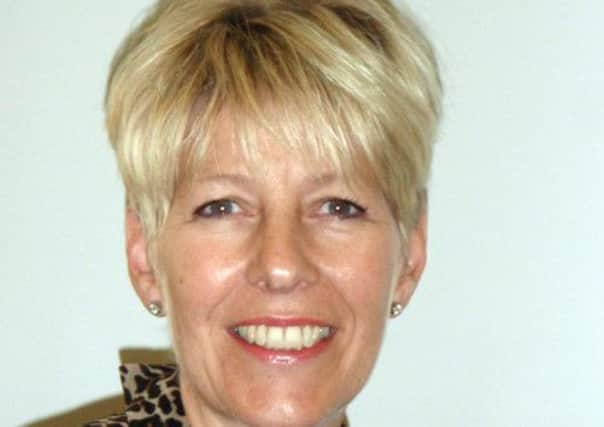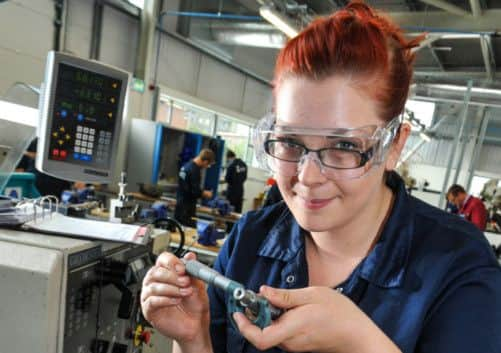Why we need more women to engineer their way to the top


CATHY Travers’s father was a civil engineer whose daughter and three sons all went into careers in engineering. After doing well at A-levels in Maths, Physics, Chemistry and Electronics and moving on to study civil and structural engineering at university, Cathy was one of six women in a year group of 66.
After graduating, in 1988 she joined Husband and Company in Sheffield, later taken over by Mott Macdonald. Today she is development director and sits on the Eastern divisional board. The company has 15,000 employees globally, and Cathy is part of a divisional management team in charge of £20m turnover.
Advertisement
Hide AdAdvertisement
Hide AdProjects she has worked on during her career so far include redevelopment of Twickenham Stadium, major PFI work, Leeds Cancer Hospital and the city’s landmark building Bridgewater Place.


Cathy says she has gone through “some stressful times” while juggling a demanding job, studying hard in the early days to gain chartered status and raising two children after six months maternity leave with each.
Cathy was lucky that when the children went to school she was able to negotiate flexible arrangements to take longer holidays, although still working full-time.
“I work very hard, but I don’t believe in the macho culture of 20-hour days,” she says. “I have stuck with the company because they have shown me loyalty and flexibility and I want to repay that. I’ve progressed faster than most of the men I started with.
Advertisement
Hide AdAdvertisement
Hide Ad“I’ve had great opportunities, which I really value and have made the most of. After returning from maternity leave, I raised my game, feeling that if I was going to be there I should really make it count. I’m really glad I stuck it out, even though there were a few tough times, including cancer treatment a few years ago. I would hope I’m a good role model to younger women – and men.”
Of 20,000 engineering graduates in the UK each year, 20 per cent are women. Fewer than one in 10 professional engineers are female (the least of any EU country), and 70 per cent of women engineers have left the profession after five years. Depending which branch you go into, it’s a career that can involve long hours, shift work, a lot of travel – and a predominantly male environment where sheer force of numbers may militate against a woman getting to the top.
Nancy Cutinha did her degree in chemical and process engineering in Tanzania, then married and had her children soon after graduation. Her husband, a surgeon, got work in England and Nancy studied for a Masters while the children were small and her husband’s job entailed moving about.
After a two-year career break Nancy got a job with Sheffield Heat and Power but her post was later made redundant. She found it difficult to find other work locally but studied for an MPhil in chemical engineering. In all she spent seven years out of employment, but tutored GCSE and A-level students and set up an internet travel company specialising in holidays to Africa.
Advertisement
Hide AdAdvertisement
Hide Ad“I really missed science and engineering,” says Nancy. “But applying for jobs was difficult because I had no recent experience.” She was selected as one of 10 on a short course at Sheffield Hallam University aimed at helping women back into science and engineering careers.
“They helped me to improve my CV, mentored me and found me a two-month work shadowing placement with Firth Rixson Metals. While there I got involved in a project on the analytical chemistry side of the operation.” Out of that placement came a full-time job as a process engineer.
“I got my confidence back and got back on the ladder, although it was at graduate level,” she says. “Engineering is still very much a male-dominated field, but we need to see more women getting to senior management level to encourage others to join the industry. It is a career I would recommend to women – but I would suggest that ideally they get a few years’ experience of industry before they have children, if they want them.
“At the moment UK industry misses out on the vital skills, knowledge and experience when women have a career break...Surely it’s not too difficult to have in place policies that allow for women to return to work after a break, and have flexible working and part-time work as options. Industry benefits from not having to replace a valuable and highly skilled member of staff.”
Advertisement
Hide AdAdvertisement
Hide AdIt’s not just the engineering industry where women are under-represented, says Denise Eaton of the Science Education Centre at Sheffield Hallam University, which runs the course Nancy took. For the last decade her team has been working with WiSet (Women in Science Engineering and Technology) to further the cause of removing barriers to girls and women in these sectors – the so-called STEM professions.
The course they’ve been running has exhausted its funding, so future courses helping women back into STEM careers will possibly need the collaboration of an industry partner. The course achieves a 66 per cent success rate in returning women to work or further study.
“Women in engineering, science, innovation, ICT and maths-related professions suffer ‘leaky pipe syndrome’ – of those who go in, many don’t stay beyond a certain level,” says Eaton. “There’s lots of research going on, but the reasons are complex, starting with gender stereotyping early on in children’s lives, when boys and girls are given different toys to play with.
“There’s an argument that trying to switch girls on to these subjects and careers choices in their teens is way too late because such attitudes are already in place. Girls need to be encouraged to keep their options open all the way through school. All children should have the option of doing three sciences at GCSE.”
Advertisement
Hide AdAdvertisement
Hide AdSheffield Hallam does a lot of outreach work in school and runs Girls’ Days for years 8 and 9 to talk to science/technology/engineering students and experience workshop activities. On March 15, 300 girls from Yorkshire schools will attend a similar event at Sheffield University, during which their teachers will separately be discussing with experts how to encourage more girls to pursue STEM degrees and careers.
There are pockets of improvement in terms of women entering and staying in engineering jobs with larger employers, says Jenny Young, manager for diversity at the Royal Academy of Engineering. But over all, if anything the number of women entering engineering jobs is slightly down, she says.
“A lot of it comes down to culture within organisations,” she says. “If you find yourself in an environment where there are other women on the same level or higher than you, then you don’t feel you’re unusual. Some employers are trying to put in place mentoring schemes and support networks, as well as flexible working that will benefit both men and women.
“Of course ‘giving reasonable consideration’ to a request for flexible working after someone has had children is not the same as actually putting the policy into practice.”
Advertisement
Hide AdAdvertisement
Hide AdToday the lack of women in many STEM professions will be discussed at an International Women’s Day conference in Leeds. Sheffield Heeley MP Meg Munn – chair of the all-party committee for women in enterprise – is one of the speakers.
She says: “Women are attracted to these industries because they understand the natural link between the contributions these sectors make in benefiting mankind. Yet when it comes to actually delivering they are let down significantly and leave within a few years. I would like to see real research done to establish why the attrition rate is so high and how we can tackle it effectively.”
The International Women’s Day conference The Gender Agenda is at The Rose Bowl Centre, Leeds LS1 3HB, from 10am until 4pm today. Info: www.managers.org.uk/events
HOW BRITAIN TRAILS ITS NEIGHBOURS
Fewer than one in 10 engineers is a woman, yet more than half of the medical workforce is female.
Advertisement
Hide AdAdvertisement
Hide AdThe proportion of women engineers in the UK is the lowest in the EU, and compares with 25 per cent in Sweden, 19 per cent in Italy and 15 per cent in Germany.
In a speech this week Business Secretary Vince Cable told manufacturers that among the main barriers to women entering technical and scientific fields, the fact that many youngsters leave school without the necessary qualifications, and cultural messages that women are not suited to such professions.
Fewer than one in 20 engineering apprentices is female and less than a third of young women aged 17-19 think engineering is a desirable profession.